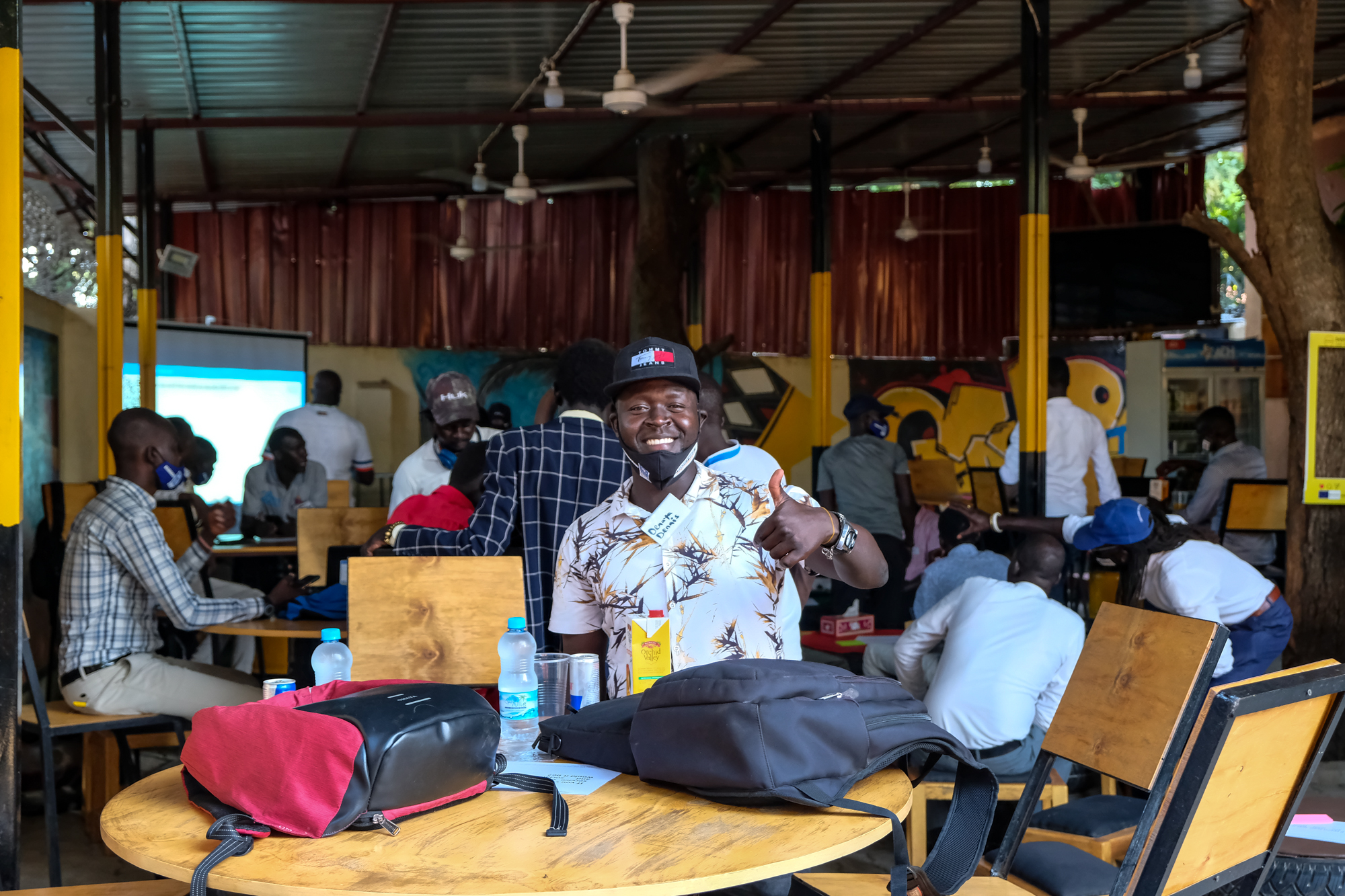South Sudan at 10: Collective Intelligence for a Hopeful New Decade

Participants at the Innovators Ecosystem Meet & Greet in Juba, South Sudan
Written by Buay Tut, Head of Exploration
On 9 July 2021, South Sudanese recognized and celebrated our 10th year as an independent nation. South Sudan gained independence on 9 July 2011 and became the 193rd member of the United Nations on 14 July 2011. As the nation reflected on these important dates, the anniversary took a more somber tone with many focusing on shortcomings and missed opportunities of the past decade. The absence of major celebratory events to mark the occasion, for several reasons, captured this mood.
Prevailing narratives on South Sudan center around political, social, and economic challenges, including: slow implementation of the peace agreement; impacts of prolonged conflict on communities, such as youth combatants, GBV, and trauma; food insecurity projected to grow; mismanagement of public resources; and overall lack of opportunities.

Although the shortcomings are well-documented, there are citizen-lead efforts that give hope to the young country. South Sudanese are persisting and championing community-based solutions across a variety of sectors and focus areas - from planning out schemes to integrate demobilized forces into farming collectives; to harnessing the circular economy via recycling efforts to create profitable ventures out of trash; to bridging traditional cooperation into the digital age to help women manage their money and protect their businesses.
Through different touchpoints, the South Sudan Accelerator Lab (AccLab) has encountered these solutions in action and is working with others who are keen to bring their concepts to life. The purpose is to work in tandem together across the local ecosystem to support and scale local grassroots solutions to development challenges. And there is a local ecosystem of determined individuals and groups devoting their time to initiatives like these, “even” in South Sudan, “even” in the present context.
Last month, with the support of UNDP Country Office and partners, the AccLab convened the first Innovators Ecosystem Meet and Greet. The first meeting was held at Scenius Hub (part of DefyHateNow, also supported by UNDP South Sudan), in Juba, South Sudan. The quarterly meeting is aimed at breaking down silos and bringing thinkers, doers, creatives, and innovators together to collectively brainstorm about innovation in South Sudan. This initiative is also meant to facilitate shared learning and enable an environment of collaboration in South Sudan.

What patterns can we discover together?
Where do we overlap and how can we work together?
What new idea, trend, or outlier can be shared with the group?
Where are you (or your organization/business) heading? And who or how can we help you get there?
In planning and facilitating the Meet and Greet, the AccLab utilized collective intelligence design principles and methodologies. This framework is founded on the principle that enhanced capacity to solve problems is created when people work together through crowd sourcing results with a wider range of data, ideas, and insights. These insights can lead to new break throughs and learnings.
The AccLab followed the collective intelligence design principles below:
- Increase diversity of the people you involve and opinions you listen to
- Integrate diverse types of data to unlock fresh ideas
- Be citizen centered: data empowerment, not data extraction
What we learned:
From the Meet and Greet we learned that innovators are eager to engage with each other and are actively looking for platforms and opportunities to collaborate and share their work. The innovation ecosystem in South Sudan needs a platform where they together can convene and share insights from their learnings and convene in a space to meet, network and market their ideas.

What's next:
- Scaling – the meeting was well attended but the AccLab realizes we can cast our net even broader for future iterations, to ensure an even more diverse collection of thought, expertise, and perspective is included in the convening – including more women and more unusual backgrounds.
- Participants mentioned an interest in learning from industry experts who are otherwise difficult for the group to access on their own. This will bring to bear UNDP’s unique value addition, as we can secure the participation of key individuals, companies, and organizations both within and outside of the country.
- Forming support and knowledge-based groups, as off-shoots of the regular Meet and Greets, with aligning skills, knowledge, and expertise that help them grow and develop their ideas together as a cohort.
- As direct feedback from the first convening, the AccLab will also integrate into the Meet and Greets streams of discussions and activities to help in forming peaceful relationships and breakdown existing barriers that divide South Sudanese society and sometimes hinder collaboration. We hope that by sharing a knowledge-based space, participants can start building a bridge with each other and learning key insights to help them build successfully in their own realms of influence.
The meeting highlighted multiple barriers and constraints facing the ecosystem and the need to find solutions to alleviate these challenges. Addressing these barriers and constraints constructively, rather than just discussing them, is critical to alleviating poverty, fulfilling expectations, and ultimately, the promise of a young nation. The AccLab therefore will continue to expand our ability to scan for grassroots solutions. We are particularly keen at looking at how people are already addressing and responding to challenges and opportunities, in all corners of the country. From this knowledge, in addition to the intelligence gathered via the regular Innovator Meet and Greets, we will advocate for scaling and mainstreaming innovative approaches and solutions.
The next decade of development in South Sudan can be one of co-creation and abundance. A strong community of support and exchange, think “where do we go from here?”, can breakthrough a decades-long narrative of “what went wrong?”. We are committed to sharing learnings and tools that encourage out-of-the-box collective intelligence, because we believe we are smarter and stronger together.


 Locations
Locations